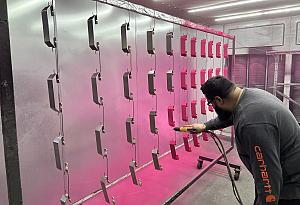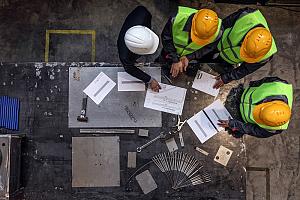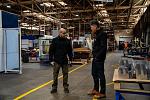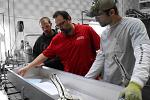- FMA
- The Fabricator
- FABTECH
- Canadian Metalworking
Categories
- Additive Manufacturing
- Aluminum Welding
- Arc Welding
- Assembly and Joining
- Automation and Robotics
- Bending and Forming
- Consumables
- Cutting and Weld Prep
- Electric Vehicles
- En Español
- Finishing
- Hydroforming
- Laser Cutting
- Laser Welding
- Machining
- Manufacturing Software
- Materials Handling
- Metals/Materials
- Oxyfuel Cutting
- Plasma Cutting
- Power Tools
- Punching and Other Holemaking
- Roll Forming
- Safety
- Sawing
- Shearing
- Shop Management
- Testing and Measuring
- Tube and Pipe Fabrication
- Tube and Pipe Production
- Waterjet Cutting
Industry Directory
Webcasts
Podcasts
FAB 40
Advertise
Subscribe
Account Login
Search
Foreign fabricators setting up shop in the U.S.
- By Vicki Bell
- October 24, 2011
Speaking to Detroit Free Press reporter Tom Walsh, GNS CEO Moon-Guy Kong, explained why he chose the U.S. and why Michigan.
Kong said an American presence is a big step in GNS's plans, and the U.S. is more welcoming to enter than fast-growing China, which "is still not an easy country for foreigners to do business (in)."
Kong told Walsh that he knew some Korean auto suppliers were locating in southern states to be close to the Hyundai and Kia assembly plants. "But I heard that some of them were having a lot of difficulty finding skilled workers and engineers for tooling and design in the South," he said.
While Kong had heard Michigan's labor costs were high, he said that changed in the industry shakeout of 2008-09, and that Michigan now is very "competitive." He said GNS pays production workers a starting wage of $13 to $15 per hour in Holland.
Kong told Walsh that the Holland plant is tracking to produce annual revenue of $20 million now and could double that with a second shift. The new Canton plant, which he hopes to open next year, could generate another $40 to $50 million.
Walsh concluded, "Not bad, in an industrial segment where Michigan has been shrinking, to see a metal bender from Korea, a country running a huge automotive trade surplus with the U.S., pump some investment dollars and new jobs into the state."
Responding to this newsletter item, a reader from a stamping company located in Michigan wrote, "My experience makes me a little leery when it comes to the Korean automotive companies. We’ve tried to get in with Kia and Hyundai down south, and they wouldn't give us the time of day. Kia and Hyundai brought their Korean suppliers and aren't making room for American suppliers. Sure, they hired American workers, but they use their Korean supplier friends.
"I'll see what kind of response I get from this company; maybe they will prove my theory wrong."
A longtime reader who works for a Texas-based company wrote, "This sounds like a good thing. The only problem is that the UAW will come in and stir up the employees and demand higher wages and benefits, and then these companies will go back to their home land and leave a lot of people without jobs—right back to the same thing they (are on) now. Between the unions and this president, this country is heading down a hard road."
A reader from Virginia shared some of the same thoughts as the reader from Texas. He also provided a very personal account of his experience in metal fabricating: "I doubt (more foreign companies will begin operations in the U.S. I am a retired sheet metal mechanic. I worked in the industry for 40 yrs. I have fabricated and installed HVAC ductwork; I also have worked in a metal fab shop and for a roofing company (fabricating flashing, guttering, TROCAL® rubber roofs, etc.). So I probably have had the opportunity to learn not just metal fab, but all different types.
"I was injured in April 2008 replacing a residential heat pump system that had been in for 18 years. While trying to get the original RA Plenum off of the end of the unit (it was horizontal in a crawl space) the back of my left hand hit a jagged edge the former installers left when they cut the flange off of the air handler. I slit it from small finger to my forefinger, and severed all four tendons—first time I had been hurt on a job. I was out of work for 16 weeks and I still have trouble with it.
"When I went to go back to work, there were no openings, and the man who owned the company died in August of that year. I was out of work until my first Social Security check started in July 2009.
"If we could get jobs in our area that pay the $13 to $15 per hour with excellent benefits, I'm sure there are plenty of people who would gladly take them.
"I don't understand why a company here in the U.S. would want to reopen a business in this country. The first thing that will happen is the employees will want more money, better benefits, etc. The next thing is they will try to unionize. In this part of the country, union is a bad word. Only a few places are unionized."
And finally, one reader from Michigan clearly doesn't like the idea of foreign entities setting up shop in the U.S. "Are you trying to tell us that there are no current U.S. metal stamping plants in Michigan or the Midwest that can do this work for Cadillac or GM?
"Why would anyone be thrilled with the thought of another foreign entity coming into the U.S. and taking our business opportunities from our manufacturers and taking our dollars in profit back to Korea, instead of keeping that money here? U.S. manufacturers would create jobs and the profit dollars would stay here and add even further to the economy. Did Korea bail out GM or did the taxpayers? Small-to-medium businesses are paying more taxes than any U.S./Korean production worker"s job is going to generate."
What's your opinion about foreign fabricators setting up shop in the U.S.?
Follow fabcomlady on Twitter.
Become a fan of The Fabricator® on Facebook.
subscribe now

The Fabricator is North America's leading magazine for the metal forming and fabricating industry. The magazine delivers the news, technical articles, and case histories that enable fabricators to do their jobs more efficiently. The Fabricator has served the industry since 1970.
start your free subscriptionAbout the Author

Vicki Bell
2135 Point Blvd
Elgin, IL 60123
815-227-8209
- Stay connected from anywhere

Easily access valuable industry resources now with full access to the digital edition of The Fabricator.

Easily access valuable industry resources now with full access to the digital edition of The Welder.

Easily access valuable industry resources now with full access to the digital edition of The Tube and Pipe Journal.
- Podcasting
- Podcast:
- The Fabricator Podcast
- Published:
- 04/16/2024
- Running Time:
- 63:29
In this episode of The Fabricator Podcast, Caleb Chamberlain, co-founder and CEO of OSH Cut, discusses his company’s...
- Industry Events
16th Annual Safety Conference
- April 30 - May 1, 2024
- Elgin,
Pipe and Tube Conference
- May 21 - 22, 2024
- Omaha, NE
World-Class Roll Forming Workshop
- June 5 - 6, 2024
- Louisville, KY
Advanced Laser Application Workshop
- June 25 - 27, 2024
- Novi, MI































